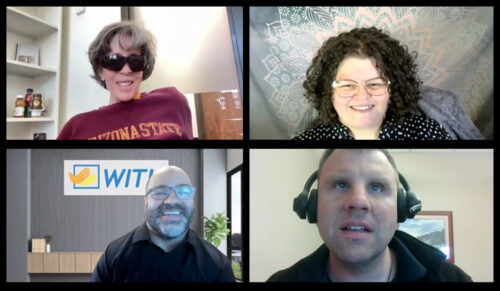On the eve of the next Wiki Education Speaker Series, we’re looking back at the powerful conversation between our most recent panelists, each bringing their professional and personal passions to improving a content area all too often neglected on Wikipedia and beyond.
Moderated by Wiki Education’s Senior Program Manager Helaine Blumenthal, the panel of scholars and advocates gathered virtually to shed light on the ongoing efforts to expand and enhance disability-related information on Wikipedia.
“We know that when you can better inform families and their loved ones that experience disability, it results in better healthcare,” said panelist Ryan Easterly, Executive Director of the WITH Foundation. “We’ve all been to a doctor’s office, not understood something they’ve said to us, and turned to Wikipedia. Our support of this work acknowledges that, and acknowledges what a powerful tool Wikipedia is when it comes to healthcare information.”
Thanks to a strategic partnership grant from the WITH Foundation, Wiki Education continues to build upon efforts to improve and expand Wikipedia’s coverage of healthcare for adults with intellectual and developmental disabilities. This initiative includes a series of Wiki Scientists courses that teaches experts in intellectual and developmental disability (I/DD) healthcare, including adults with lived experience of I/DD, to contribute their expertise to Wikipedia.
One such expert is Diana Boling, a registered nurse and professor at Xavier University College of Nursing, who shared her experience learning to edit Wikipedia as a Wiki Scientists course participant herself.
“Much of my [Wikipedia] journey has been fueled by curiosity,” Boling explained. “Where can I show up better? How can I be a better nurse? How can I be a better neighbor or human?”
Echoing Easterly’s reflection of Wikipedia’s real-world influence, Boling emphasized the critical connection between Wikipedia, scholarship, and lived experience.
“As many of us know as scholars, our textbooks don’t always capture information in the most accurate or useful ways,” said Boling. “Educators, particularly nurses and other healthcare providers, need to be educated about how we can leverage Wikipedia. And hopefully folks with lived experiences are contributing to it, which can then help healthcare providers reach their patients in meaningful ways rather than in stereotypical, less effective, or sometimes even alienating ways.”

As an early editor of Wikipedia, the first blind administrator on English Wikipedia, and now the technology program lead at the Braille Institute, panelist Skylar Covich has brought his own lived experience and expertise to the online encyclopedia for many years. His contributions include article creation and improvements for notable individuals within blind culture, organizations for the blind, and access technology for the blind.
Covich also encouraged individuals with lived experience to review the Wikipedia articles related to their own conditions and help fill the gaps.
“There are things that could be added about the experiences of what it’s like [to have these conditions] that are less in the medical field and more in the cultural field,” Covich noted. “The references are out there, it just takes effort.”
Panelist Terri Hlava’s students are more than familiar with the research efforts needed to contribute to Wikipedia – the Arizona State University professor has incorporated a Wikipedia assignment into her Policy Advocacy and Disability courses in the School of Social Transformation, as well as the course Justice and Disability: The Social Construction of Disability.
“[The assignment] has been just tremendous for team building, trust building, community building, and knowledge building throughout the process,” said Hlava. “We always have presentations at the end of class, and it’s really been lovely to see the students have so much confidence in what they’re saying and be so proud of what they’ve done.”
Hlava loves the moment where her students realize the scope and reach of their work on Wikipedia.
“We go online as a class, and they see how many zillions of times their articles have been looked at,” said Hlava. “And then without fail, their jaws dropped to the floor and they gasp in amazement. I love that for them.”
As the webinar reached its end, the panelists were asked to share what made them hopeful for the future of disability representation on Wikipedia. Easterly emphasized opportunities to engage new editors, Covich acknowledged the historic growth of Wikipedia’s coverage in this topic area, and Hlava and Boling shared that the panel discussion itself gave them hope.
“Opportunities like this to share, to educate, and to travel the landscape together more often and more deeply,” answered Hlava.
Catch up on our Speaker Series on our YouTube channel and join us for our next webinar tomorrow, June 10!
Gaps & Growth: Enhancing Latino/x/é and Latin American content on Wikipedia
Tuesday, June 10, 2025
9:30am Pacific / 12:30pm Eastern
REGISTRATION
Live interpretation from English to Spanish will be available to attendees during this webinar.
Brechas y crecimiento: Mejorando el contenido latino/x/é y latinoamericano en Wikipedia
Martes, 10 de junio, 2025
9:30am Pacífico / 12:30pm Este
INSCRIPCIÓN
Interested in incorporating a Wikipedia assignment into your course? Visit teach.wikiedu.org to learn more about the free resources, digital tools, and staff support that Wiki Education offers to postsecondary instructors in the United States and Canada.
Visit learn.wikiedu.org to explore our editing courses for subject matter experts.
